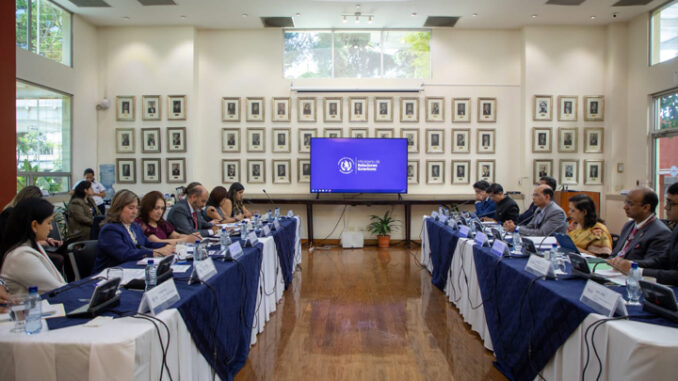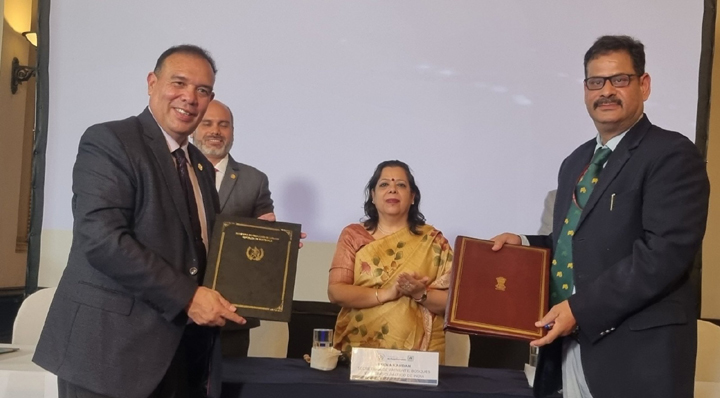
GUATEMALA CITY (TIP): A 4-member delegation from Ministry of Environment, Forest and Climate Change led by Ms. Leena Nandan, Secretary visited Guatemala from 3-6 May 2024 to sign MoU on Conservation of the Tiger (Panthera Tigris) and the Jaguar (Panthera Onca). Other members of the delegation representing the Ministry were Dr. Gobind Sagar Bhardwaj, ADG and Member Secretary (NTCA); Shri Sujit Kumar Bajpayee, Joint Secretary; and Shri Amit Raj, Director.

The signing ceremony of the MoU took place at the National Palace of Culture in Guatemala City on May 3, 2024. During the signing ceremony, India highlighted its successful Project Tiger initiative, launched in 1973, which has significantly increased the tiger population, offering to share conservation expertise with Guatemala. This includes advanced technologies like artificial intelligence and satellite imaging, as well as capacity-building training programs. India’s experience in managing large predator reintroductions, such as cheetahs from Africa, underscores its readiness to collaborate with Guatemala to address threats facing the native Jaguar population. India invited Guatemala to join the International Big Cat Alliance and proposed signing a comprehensive MoU to address broader environmental issues beyond tiger and jaguar conservation, focusing on strengthening monitoring and control measures.

The event also featured video presentations on “50 Years of Project Tiger: Reviving the Roar of the Big Cats” from Indian side and “Jaguar (Panthera Onca) Conservation Actions in Guatemala” from CANAP, Guatemala. In her opening remarks, Ms. Leena Nandan, Secretary, expressed gratitude for the MOU signing, emphasizing its significance in bolstering joint conservation efforts between India and Guatemala. She highlighted the joint commitment reflected in the MOU to protect iconic and endangered species like the Tiger and Jaguar, emphasizing the resolve to combat wildlife trafficking and preserve biodiversity. She commemorated the 50th anniversary of Project Tiger, lauding India’s success in increasing the tiger population and its contribution to climate change mitigation. Ms. Nandan underscored India’s initiatives under Prime Minister Shri Narendra Modi‘s leadership, including the International Solar Alliance and efforts in renewable energy, as well as environmental schemes like Namami Gange and Swachh Bharat Abhiyan. She drew parallels between Mayan civilization and ancient Indian culture, both embracing sustainable living practices, and reiterated India’s commitment to environmental conservation for a greener, healthier planet.
In his speech Vice Minister of Environment and Natural Resources, Mr. José Rodrigo Rodas, focused on the significant challenges facing the iconic Guatemalan species, the Jaguar. He highlighted that the Jaguar’s habitat in Guatemala is continuously threatened by deforestation, forest fires, and illegal hunting. Despite these challenging conditions, a robust Jaguar population has been observed in southern Petén and the Caribbean region of Amatique. Mr. Rodas emphasized the vital importance of the Jaguar to Guatemala, not only for environmental preservation but also for its cultural and economic significance to indigenous communities. He noted that forest fires pose a significant challenge in Guatemala, which has lost about half of its forest cover.
The delegation also participated in several bilateral meetings with the Ministry of Foreign Affairs and the Ministry of Environment and Natural Resources of the Government of Guatemala. These productive discussions highlighted the strengthening of India-Guatemala relations. During the meetings, India extended invitations for Guatemala to join the Coalition for Disaster Resilient Infrastructure (CDRI) and the International Big Cat Alliance (IBCA). Celebrating India’s leadership in tiger conservation, India offered its expertise to help enhance Jaguar populations in Guatemala. Additionally, India’s proactive climate change initiatives, including its leadership in the International Solar Alliance (ISA), were showcased, with India inviting Guatemala to become a member. The Guatemalan side assured that they will evaluate and monitor the Jaguar population both inside and outside the protected areas, addressing major challenges in conservation such as deforestation, forest fires, and illegal hunting. There is a robust Jaguar population in southern Petén and the Caribbean region of Amatique in Guatemala.
Last year India celebrated the 50th anniversary of an intensive conservation effort known as Project Tiger, which resulted in the tiger population to nearly double to 3167, compared to only 1800 in the 1970s. Currently, India is the largest tiger range country in the world. Research has shown that India’s tiger conservation policy has not only helped in preserving and increasing tiger populations, but it has also played a role in climate change mitigation by avoiding forest loss. India is home to over 70 percent of the world’s endangered tiger population.
The MOU will pave the way for cooperation in related areas, strengthen the bilateral relations between India and Guatemala, and support Guatemala’s efforts to conserve the Jaguar population and preserve its forest coverage and sustainable development. This landmark agreement will signify joint commitment to protecting one of the world’s most iconic and endangered species. By collaborating on conservation efforts, sharing best practices, and enhancing research and monitoring initiatives, both nations aim to safeguard the future of tigers and their habitats, ensuring their survival for generations to come. This MoU underscores mutual resolution to combat wildlife trafficking, promote sustainable ecosystems, and preserve biodiversity on a global scale. Additionally, the productive meetings and engagements throughout the visit laid the groundwork for future cooperation and mutual understanding. As both nations continue to deepen their partnership, signing of this significant MoU served as a testament to the shared values and aspirations of India and Guatemala towards a more sustainable and prosperous future.




Be the first to comment